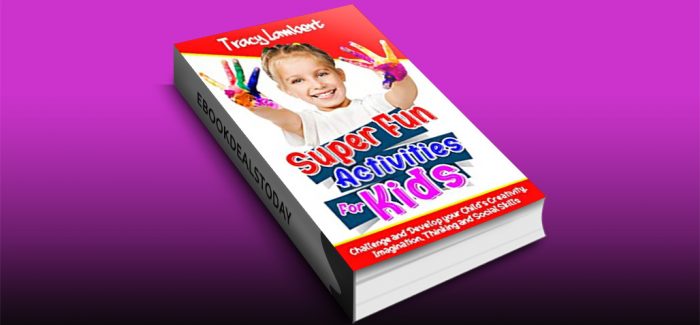Super Fun Activities for Kids by Tracy Lambert

Admin | On May 13, 2020
Realtime Price – $2.99
Super Fun Activities for Kids: Challenge and Develop your Child’s Creativity, Imagination, Thinking and Social Skills
Studies show that, on average, children up to the age of 8 spent more than 2 hours in front of a screen daily. Children aged between 8 and 12 spent even more time in front of screens (more than 4 and a half hours, in fact!). This leads to a sedentary life starting from childhood and a very unhealthy lifestyle.
A powerful and easy solution to this is to not dismiss games and activities you and your entire generation played and engaged in as children, thinking times have changed. They haven’t. The time for play is still here, now!
The book “Super Fun Activities for Kids” is a collection of more than 100 games and activities which both you and your children will definitely enjoy, ideas bound to help children develop in a balanced, healthy way.
Tracy Lambert is an empowerment coach, speaker, writer and mother who believes that the more empowered you can teach your children to be, the easier it is for them to balance their lives for fulfilling accomplishments. Having the experience of balancing family life with reaching to the children in her classroom, Tracy describes the activities with simplicity, making it accessible and easy to teach.
The book “Super Fun Activities for Kids”’s main purpose is to come as an aid to parents who want their children to grow up harmoniously, who want their children to:
- Learn
- Love education
- Read
- Be creative and imaginative
- Know how to socialize
- Develop their intelligence and their natural talents
- Grow into adults with a rounded personality
- Become fully conscious of how important it is to play, as well as how important it is to help others.
Play is a cherished part of childhood that offers children important developmental benefits and parents the opportunity to fully engage with their children (American Pediatrics Association)
Parents need to feel supported to not passively accept the media and advertising messages that suggest there are more valuable means of promoting success and happiness in children than the tried, trusted, and traditional methods of play and family togetherness (Committee on Psychosocial Aspects of Child and Family Health, 2006–2007)
Genre: Educational, NonFiction
Super Fun Activities for Kids: Challenge and Develop your Child’s Creativity, Imagination, Thinking and Social Skills by Tracy Lambert
Related Posts
Find The Best in U by Leena Joshi October 2, 2019 | Admin

The Furnace of Affliction by Horace Williams Jr.... September 30, 2020 | Admin

Super-Delicious Mediterranean Diet Cookbook For Beginners by Janet Evans... April 17, 2024 | Admin

Your Fabulous First Book by Andrea Susan Glass... January 14, 2021 | Admin

Atlantis Pyramids Floods: Why Europeans Are White by Dennis Brooks... June 8, 2016 | Admin

Keto Diet with Coffee by Dreamer Cook February 8, 2025 | Admin




Submit a Comment